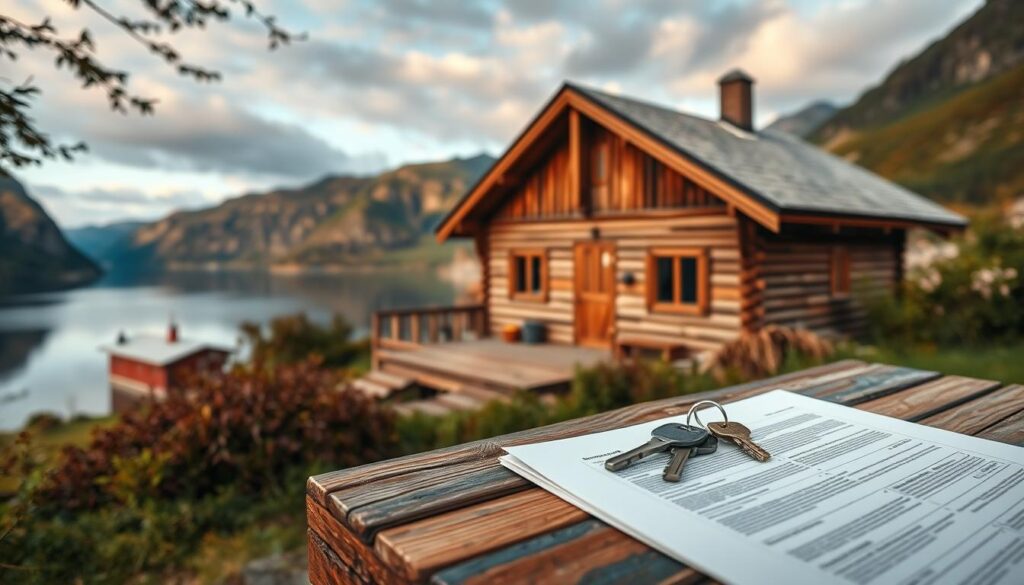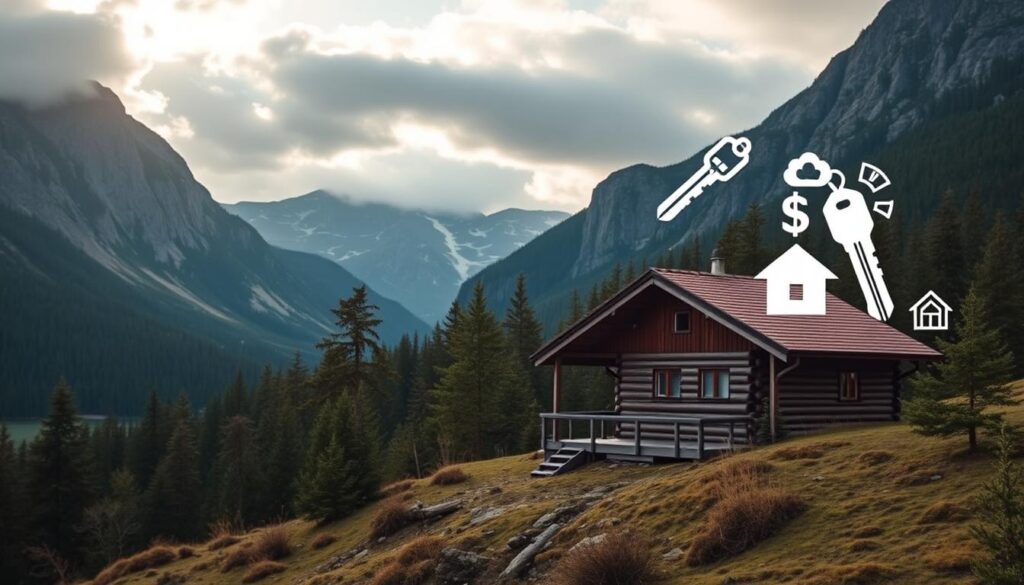Are you wondering if foreign investment in Norwegian real estate is possible? The good news is that Norway’s real estate market is open to non-Norwegian citizens, with the same rights as locals. Whether you are looking to buy residential or commercial property, the process is straightforward and typically takes 1 to 2 months to complete1. There are no residency requirements for foreigners, and expats can easily acquire properties in cities like Oslo, Bergen, Trondheim, and Stavanger1.
The Norwegian real estate market is robust, supported by a strong local economy, and continuous property development2. However, the process involves several legal and procedural steps, such as identifying the property, drafting a sale-purchase contract, and registering the title deed. It is advisable to seek legal counsel to navigate these steps smoothly, ensuring compliance with Norwegian laws and verifying the property’s legal status2.
Key Takeaways: How to Buy a Property in Norway
- Non-Norwegian citizens can buy both residential and commercial properties in Norway.
- The property acquisition process usually takes 1 to 2 months.
- There are no residency requirements for foreign buyers1.
- Legal counsel is recommended to ensure compliance with Norwegian laws.
- The real estate market in Norway is considered robust and attractive2.
Contact us if you are Interested in Buying Property Abroad!
Introduction: Overview of Foreign Property Ownership in Norway
Norway’s striking natural beauty, paired with a robust economy and high living standards, has made it an attractive destination for individuals interested in buying a house in Norway as a non-resident. The transparency of the property market and the involvement of professional parties like real estate agents have contributed to the appeal of Norwegian real estate for foreign buyers.
The Appeal of Norwegian Real Estate for Foreign Buyers
Compared to other countries, Norway offers a straightforward and regulated process for investing in Norwegian property as a foreigner. The legal framework supports this transparency, thus providing a secure environment for investments. In 2017, 2% of the value of Norwegian privately held real estate was owned by foreign individuals and corporations, a figure that increased to 10% when focusing on real estate owned specifically through corporations3. Additionally, the total value of real estate owned by foreign entities was an astounding USD 18.8 billion, compared to the USD 5.3 billion owned directly by foreign individuals3.
Legal Status of Foreign Property Ownership
Foreigners are allowed to purchase real estate without significant restrictions and can enjoy the same ownership rights as Norwegian citizens. This includes personal ownership, tenant-owned buildings, and commercial properties. In 2017, 78% of foreign-owned real estate in Norway was corporate-owned, highlighting the favorable conditions for investing in Norwegian property as a foreigner3. Interestingly, Luxembourg emerged as a significant player, second only to Sweden in terms of real estate ownership in Norway, a trend driven by beneficial tax policies and stable economic conditions3. For more detailed information, you can explore the comprehensive process and guidelines by referring to this guide3.
The legal foundation for foreign property ownership is robust, offering a favorable investment climate without the need for residence permits. This regulated and transparent system, overseen by Norwegian authorities, ensures that the rights of foreign buyers are protected, making it a compelling choice for those looking to invest in Norwegian property as a foreigner.
Legal Framework and Regulations for Foreign Buyers

The rules for foreign buyers in Norway and the regulations for expats buying property in Norway are designed to be straightforward and welcoming. Understanding these rules is essential for a smooth and efficient property acquisition process. Given the comprehensive legal framework, non-residents can purchase real estate, except for specific cases involving agricultural land.
The Sale of Property Act
The Sale of Property Act governs the purchase and sale of property in Norway, applying equally to both foreigners and residents rules for foreign buyers in Norway4. This legislation ensures that transactions are transparent, providing a clear structure for both buying and selling parties. Legal assistance, such as due diligence services, is advised to safeguard the investment and verify the property’s legal status4.
Residency Requirements for Property Ownership
Interestingly, foreign buyers do not need a residence permit to purchase property in Norway, as long as they comply with the general regulations for expats buying property in Norway5. However, for those utilizing the property solely as a secondary residence or cabin, regulations may differ. Generally, residents are required to inhabit their property for at least five years before using it as a second home5.
Approval Requirements for Agricultural Land
For buyers interested in agricultural land, special approval from Norwegian authorities might be necessary. This approval process typically ensures that the land will be used for its intended agricultural purpose and adheres to local regulations5. However, standard residential properties are exempt from such stringent requirements, making it easier for foreign investors to enter the Norwegian real estate market5.
Types of Properties Available for Purchase in Norway

Norway offers a diverse range of properties tailored to suit various investment preferences. These types of properties in Norway include residential, commercial, and unique ownership forms such as Borettslag and Aksjeleilighet.
Residential Properties
Residential properties in Norway include houses, apartments, and condominiums. The average price per square meter for these properties varies significantly by location, with Oslo being one of the most expensive markets at $9,000 per square meter for apartments, while areas like Rugaland and Innlandet offer more affordable options at $4,000 and $2,100 respectively6.
In terms of rental options, the average monthly rent in cities like Oslo and Bærum is around 11,240 NOK (1,230 USD), and it drops to 8,740 NOK (950 USD) for the country average7. This range provides flexibility for both investors and residents looking for housing.
Commercial Properties
Commercial properties in Norway encompass offices, retail spaces, and industrial buildings. The average price for commercial real estate is about $2,000 per square meter6, making it a viable option for businesses and investors alike. These properties cater to various business needs and can range from small retail shops to large industrial complexes.
Additionally, land for development or agricultural usage is available, with an average cost of approximately $40 per square meter6. This provides opportunities for both commercial expansion and agricultural investment.
Special Ownership Forms: Borettslag and Aksjeleilighet
Norway also offers unique ownership forms such as Borettslag and Aksjeleilighet, which cater to different investment and living preferences. A Borettslag is a type of cooperative housing where individuals own shares in a housing association that grants them the right to reside in a specific unit. This form of ownership promotes community living and shared maintenance responsibilities8.
Alternatively, Aksjeleilighet is an apartment within a housing company where ownership is based on shares rather than direct property ownership. This offers a different mode of investment where owning shares in the company grants the rights to occupy an apartment8. Both these forms of ownership provide flexibility and cater to the unique preferences of investors and homeowners.
| Property Type | Average Price per Square Meter |
|---|---|
| Residential (apartments) | $9,000 (Oslo), $5,800 (Viken), $4,000 (Rogaland), $2,100 (Innlandet) |
| Commercial | $2,000 |
| Land | $40 |
- Houses in Norway can range significantly in cost due to various factors like location and size, reflecting prices from standalone houses to apartments and villas6.
- Engaging a Norwegian lawyer or legal advisor can be beneficial to ensure smooth transactions and understanding of local property laws8.
Contact us if you are Interested in Buying Property Abroad!
Process of Buying Property in Norway

The process of purchasing property in Norway as a foreigner starts with finding a reliable real estate agent who can assist in navigating the market and understanding the Norwegian property purchase process9. Working with an agent who understands local conditions and regulations can greatly simplify your search and negotiations.
Finding a Real Estate Agent
When looking for a real estate agent, it is crucial to choose someone experienced in dealing with foreign buyers. An agent can bridge the gap in understanding local property trends and provide valuable insights into the buying process. It’s recommended to hire an agent who is registered with the Norwegian Association of Real Estate Agents (NEF) for credibility and expertise.
Steps Involved in the Property Purchase
The Norwegian property purchase process typically involves several key steps. After selecting a suitable property, the buyer can make an offer. If accepted, a sales contract is drawn up, detailing the transaction conditions to protect both buyer and seller9. This is followed by obtaining the property deed and registering it, a process that generally takes about three days.
It is important to understand that offers during property auctions must be submitted in writing and usually require a minimum acceptance time limit10. Also, securing financial arrangements in advance can be beneficial since Norwegian banks might require 15% equity for buying a property10. This percentage can be higher if you’re purchasing multiple properties or holiday homes, for which 40% equity may be needed.
- Finding a real estate agent.
- Viewing and selecting a property.
- Making an offer.
- Signing the sales contract.
- Obtaining and registering the property deed.
Key Documents Needed
The following documents are essential for completing a property purchase in Norway:
- Identification papers (passport or national ID)
- Sale-purchase contract
- Bank statement indicating payment
- Title deed in the seller’s name
- Certificate of non-encumbrance
Engaging reputable legal counsel is highly recommended to ensure thorough preparation and verification of these documents. This will help mitigate potential pitfalls such as residency requirements, taxes, and market competition. Another important aspect is finalizing your financial agreements early, as most banks in Norway offer mortgages with repayment periods ranging from 20 to 30 years11. Typically, individuals can borrow up to 85% of the property price or 3 times their annual income11.
For more detailed insights on the Norwegian property purchase process, you can refer to reliable sources online9.
Can Foreigners Buy Real Estate in Norway?

Foreign citizens have the right to buy and own property in Norway, mirroring the rights enjoyed by native Norwegians1. The process of acquiring real estate typically takes about 1 to 2 months, without the need for any specific visa or residency status12. Notably, there are no residency requirements for foreign citizens to purchase real estate in Norway1. Importantly, property prices in Norway remain accessible to foreign investors, and due diligence services are recommended for all real estate purchases1.
While foreigners are generally allowed to purchase property in Norway, they may face some restrictions such as being unable to buy agricultural land or land designated for public use12. Norwegian cities like Oslo, Bergen, Trondheim, and Stavanger are particularly attractive for property investments1. Foreigners interested in buying property would also benefit from understanding the local tax obligations, which include transfer stamp duty, Cadastre registration fee, wealth tax, annual property tax, and potentially rental tax1.
Finding housing in Norway often involves online research on platforms like Finn.no or Boligbygg, and expats frequently seek homes close to public transportation with amenities such as large bedrooms and in-unit laundry facilities12. In preparing for a purchase, it is advisable to get a real estate agent’s assistance to navigate the competitive market and understand the required documents, such as tax returns and payslips, for mortgage approval1.
Financing Options for Foreign Buyers

Foreign buyers looking to purchase real estate in Norway have several financing options, tailored to suit diverse needs. Understanding these choices, especially pertaining to mortgage availability and specific conditions, is crucial for any non-resident investor.
Mortgage Availability for Foreign Citizens
Obtaining a mortgage for foreign buyers in Norway is quite feasible, with private banks offering loans that cover up to 85% of the property’s cost13. On average, repayment periods for these mortgages range from 20 to 30 years, making long-term investments manageable for non-residents13. Additionally, foreign citizens can potentially borrow up to five times their annual income to fund their property purchase13.
For those unable to secure traditional bank mortgages, the Norwegian State Housing Bank provides municipal start-up loans, which may cover 100% of the home price. Each municipality has specific policies to determine qualification conditions and loan amounts, thereby providing essential support to foreign investors13.
Financing Conditions and Requirements
To access real estate financing for non-residents, foreign buyers must usually provide equity amounting to 25% of the property’s sales value when applying for a mortgage13. The process to receive official mortgage approval typically takes around two weeks, offering relatively swift access to necessary funds13.
It’s important to note that special mortgage schemes are available, particularly beneficial for first-time buyers. These may involve conditions allowing for the financing of the entire purchase price, facilitating a smoother entry into the property market. Evaluating these opportunities and aligning them with personal financial circumstances will ensure a more effective real estate investment.
Potential Costs Involved in Purchasing Property
Understanding the real estate transaction costs in Norway is vital for potential buyers. These costs can vary, including legal fees, property purchase fees, and other additional expenses.Norway’s stable and growing market is attractive, but it’s crucial to be aware of the associated costs.
Legal Fees and Tax Implications
When purchasing property in Norway, buyers should plan for legal fees and taxes. The stamp duty for property transfer is 2.5% of the fair market value14, while corporate income tax on gains from real estate sales is 22%14. Moreover, transactions involving the sale of commercial properties may face VAT liabilities, which could affect the overall cost significantly14.
Contact us if you are Interested in Buying Property Abroad!
Real Estate Agent Fees
Real estate agents in Norway typically charge a commission ranging from 1% to 2.5% of the property’s purchase price4. This cost is negotiated between the buyer and the agent, and can vary based on the property’s location and value. Given the high demand and competitive market, especially in cities like Oslo and Bergen, it is important to factor these fees into your budget4.
Additional Costs: Notary and Registration Fees
Buyers also need to account for notary and registration fees as part of their real estate transaction costs in Norway. These fees cover the administrative processes required to officially register the property in the new owner’s name. Although these costs vary, ensuring all legal documentation is appropriately managed is crucial to avoid future disputes.
A thorough understanding of these property purchase fees helps budget effectively and avoid unexpected financial surprises. To learn more about the specifics of investing in Norwegian real estate, consider visiting this detailed guide41514.,,
The Importance of Real Estate Due Diligence

When engaging in the real estate market in Norway, conducting a thorough real estate due diligence in Norway is indispensable. This process not only verifies the legal status of the property but also assesses potential risks. Skipping property legal verification can result in unexpected costs and legal challenges post-purchase, especially in a country where properties are often sold “as-is” real estate due diligence in Norway16.
Legal Verification of Property Status
Ensuring proper verification of the legal status of a property is crucial for foreign buyers. This includes analyzing ownership documents, checking against inheritance laws, and understanding property-specific regulations. Transfer of ownership and title registration in the Land Register are necessary to protect the purchaser from creditors and previous owners16. The Property Unit Ownership Act in Norway allows for the division of properties into units (eierseksjoner) owned by individuals or legal entities16. Engaging legal professionals can greatly assist in navigating this process, ensuring that no crucial step is overlooked.
Environmental and Surrounding Area Analysis
A comprehensive real estate due diligence in Norway extends beyond legal verification to include environmental and surrounding area analysis. This involves assessing the property for environmental risks, such as potential contamination or flooding. Additionally, buyers should analyze the accessibility to utilities and other essential services. Conducting an in-depth environmental assessment provides critical insights into the long-term viability of the investment, potentially safeguarding buyers against future legal and environmental issues.
| Aspect | Description |
|---|---|
| Ownership Documents | Verify all legal ownership papers and agreements. |
| Environmental Risks | Check for contamination, flooding risk, and other hazards. |
| Zoning Laws | Understand local zoning laws and how they affect property use. |
| Utilities Access | Ensure the property has access to necessary utilities. |
Involving professionals like lawyers and surveyors can be incredibly beneficial during this process. According to research, due diligence is crucial in asset deals in Norway to ensure accurate property titles and registration16. In addition, the majority of large-scale real estate transactions in Norway involve the sale and purchase of shares in a single-purpose limited liability company, which helps isolate financial and legal risks associated with owning real estate assets17.
Ultimately, a thorough real estate due diligence in Norway ensures a secure and informed investment, minimizing potential risks and enhancing peace of mind for foreign investors.
Best Cities for Foreign Buyers to Consider
Norway offers a range of cities for those considering investing in real estate, each with its unique appeal and potential returns. Notably, Oslo stands out as a prime location for purchasing property, driven by its robust job market and cultural attractions. Those interested in the bustling capital should note that the purchasing property in Oslo can be competitive but worthwhile for long-term investment.
Oslo
The capital city, Oslo, is one of the best cities in Norway for real estate investment. Known for its vibrant urban life, numerous business opportunities, and cultural institutions, it attracts both expats and locals alike. Despite facing challenges, such as the decreased value of the NOK with 1 Euro being worth 12 NOK as of May 202318, Oslo continues to offer significant investment potential. The possibility to acquire various property types without residency requirements further enhances its appeal1.
Bergen
Bergen, famous for its stunning landscapes and gateway to the fjords, offers a different yet appealing investment atmosphere. The city provides great outdoor activities and a strong sense of community. For foreign investors, Bergen is notable for its relatively stable real estate market and picturesque surroundings. Purchasing property in Bergen can be particularly enticing for those seeking a tranquil lifestyle without sacrificing urban amenities18.
Trondheim and Stavanger
Trondheim is known for its historical significance and vibrant local community, making it a valuable consideration for real estate investments. On the other hand, Stavanger, with its strong ties to the oil and gas industry, presents lucrative opportunities for high-yield investments. Both cities, despite their unique characteristics, provide excellent platforms for foreign buyers considering entering the Norwegian property market, with no special property acquisition programs but available financing options1.
Smaller Cities and Rural Areas
For those seeking more affordable and unique property options, smaller cities and rural areas in Norway can be ideal. These locations offer distinct lifestyles, often at lower costs, making them attractive for a variety of investors. The choice of location should align with one’s personal and financial goals, considering the financial challenges and cost of living issues highlighted among foreigners in Norway as per SSB study18. Moreover, the support available in purchasing a property and the ability to appoint a local representative during transactions are notable advantages1.
For more comprehensive guidance on investing abroad, consider checking out the best countries for investment in18.
Conclusion
Investing in real estate in Norway is an unparalleled opportunity for foreigners seeking to diversify their portfolios and gain access to a stable and thriving market. Foreign buyers can rest assured that Norway’s property laws are clear and non-restrictive, making the process of Norway property acquisition straightforward and transparent. Whether considering residential or commercial properties, the availability is vast, catering to different investment needs. For instance, with approximately 350,000 ground leases existing in Norway, both residential and commercial properties are well represented19.
The successful real estate investment in Norway requires thorough due diligence, which is vital given the country’s specific regulations and tax considerations. Sellers in asset deals face a 22% tax on gains, while individual shareholders in share deals face a 31.68% tax19. Understanding these nuances, including the 2.5% stamp duty on asset deals and the absence of such on share deals, is essential19. Furthermore, prospective buyers must be prepared for down payments that typically range from 15% to 40% of the property’s value15.
In conclusion, the Norwegian real estate market is open, transparent, and full of investment potential for foreign buyers. The structured legal framework, combined with a variety of property types and financing options, makes it an attractive market. Consulting with legal professionals, understanding the associated costs—including realtor fees, which typically range from 1-2%, and property transfer taxes at 2.5%—and conducting comprehensive due diligence are critical steps toward securing a successful real estate investment in Norway15. This strategic market offers substantial benefits, establishing Norway as a prime destination for international property acquisition.
Contact us if you are Interested in Buying Property Abroad!
FAQ
Can foreigners buy real estate in Norway?
Yes, foreigners have the same rights as locals when buying property in Norway. There are no legal restrictions barring them from investing in residential or commercial properties.
What is the appeal of Norwegian real estate for foreign buyers?
Norway’s stunning natural beauty, strong economy, and high living standards make it an attractive destination for property investments. Cities like Oslo, Bergen, Trondheim, and Stavanger offer diverse opportunities for investors.
What are the legal requirements for foreign property ownership in Norway?
Foreigners can buy and own property in Norway without any restrictions. This includes residential, tenant-owned buildings, and commercial properties. There is no need for a residence permit except in some cases involving agricultural land.
What is the Sale of Property Act?
The Sale of Property Act regulates the purchase and sale of property in Norway, ensuring that both foreign and local buyers adhere to legal requirements. Seeking legal counsel is recommended to ensure compliance.
Are there any residency requirements when buying property in Norway?
No, foreigners do not need a residence permit to acquire properties in Norway. However, buying agricultural land may require specific approval from Norwegian authorities.
What types of properties are available for purchase in Norway?
Prospective buyers can choose from a variety of property types such as residential homes, flats, cooperative housing (Borettslag), apartments in housing companies (Aksjeleilighet), and commercial properties.
How is the process of buying property in Norway structured?
The property acquisition process usually takes 1-2 months and involves finding a real estate agent, drafting necessary documents, and registering the title deed. Key documents needed include identification papers, sale-purchase contract, bank statement, and a certificate of non-encumbrance.
Are mortgages available to foreign buyers?
Yes, foreign buyers have various financing options, including mortgages from private banks. They can borrow up to 85% of the property’s cost or up to three times their annual income. Some institutions offer special mortgages for first-time buyers.
What are the potential costs involved in purchasing property in Norway?
Buyers should consider costs such as legal fees, transfer taxes, real estate agent’s commission (typically 1% to 2.5% of the purchase price), and notary and registration fees. In Oslo, a 2.5% transfer fee is applied upon purchase.
Why is due diligence important in the Norwegian real estate market?
Due diligence is crucial to evaluate the property’s legal status, documentation, and potential risks. This includes checks against inheritance laws and environmental assessments, safeguarding investors against undisclosed issues.
What are the best cities in Norway for foreign buyers to consider?
Oslo offers cultural attractions and job opportunities, Bergen is known for its beauty and outdoor activities, Trondheim has historical significance, and Stavanger has a strong oil and gas industry. Smaller cities and rural areas provide unique lifestyles and often more affordable options.
Source Links
- https://www.lawyersnorway.eu/purchase-a-property-in-norway
- https://www.lifeinnorway.net/buying-a-house-in-norway/
- http://congress-files.s3.amazonaws.com/2023-07/Cross_Border_Real_Estate.pdf
- https://investropa.com/blogs/news/norway-real-estate-foreigner
- https://sites.google.com/view/glutnitranbu
- https://geoln.com/real-estate/norway
- https://www.internations.org/norway-expats/guide/housing
- https://probashirealty.com/a-foreign-buyers-guide-to-purchasing-real-estate-in-norway/
- https://investropa.com/blogs/news/norway-us-citizen-property-ownership
- https://wataha.no/en/2023/01/25/Buying-a-property-in-Norway-step-by-step/
- https://relocation.no/expat-communities/national-information/housing/buying/
- https://www.expatexchange.com/gd/9/85/Norway/Real-Estate-in-Norway
- https://localmarket.no/en/blog/guidance-to-real-estate-market-how-to-finance-home-buying-in-norway
- https://assets.kpmg.com/content/dam/kpmg/no/pdf/2021/09/NO_Investing_In_Real_Estate_In_Norway_2021_Final.pdf
- https://cheapavailablecottages.com/the-ultimate-guide-to-buying-a-house-in-norway-as-a-foreigner/
- https://www.dlapiperrealworld.com/export/sites/real-world/guides/downloads/Norway-Investment-Guide-2019.pdf
- https://cms.law/content/download/688642/file/CMS How to Invest in Real Estate in Norway_14.05.2024.pdf
- https://afroginthefjord.com/2023/07/31/is-it-still-worth-it-to-live-and-work-in-norway/comment-page-1/
- https://www.lawyernorway.no/post/real-estate-in-norway-a-comprehensive-overview

Comments